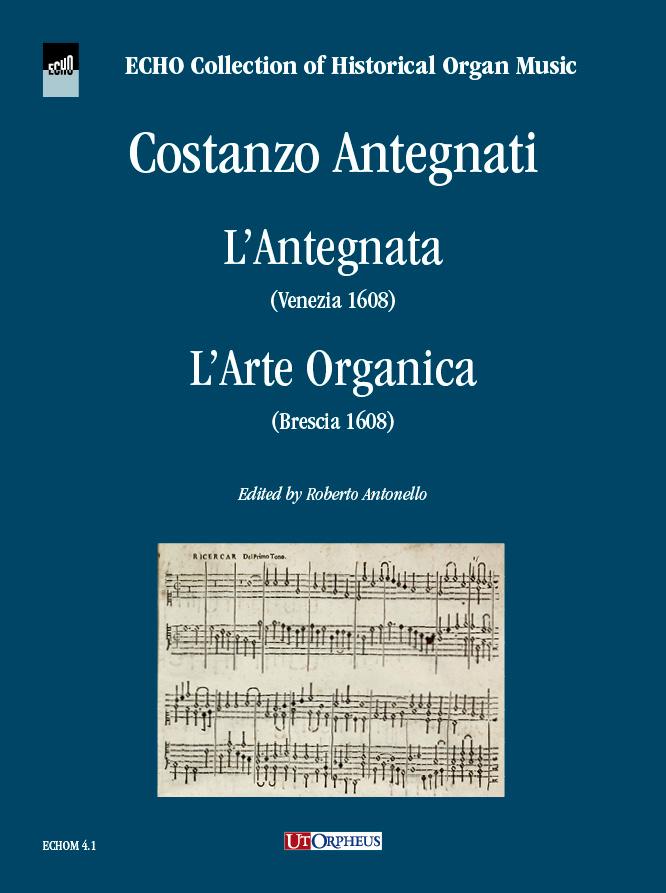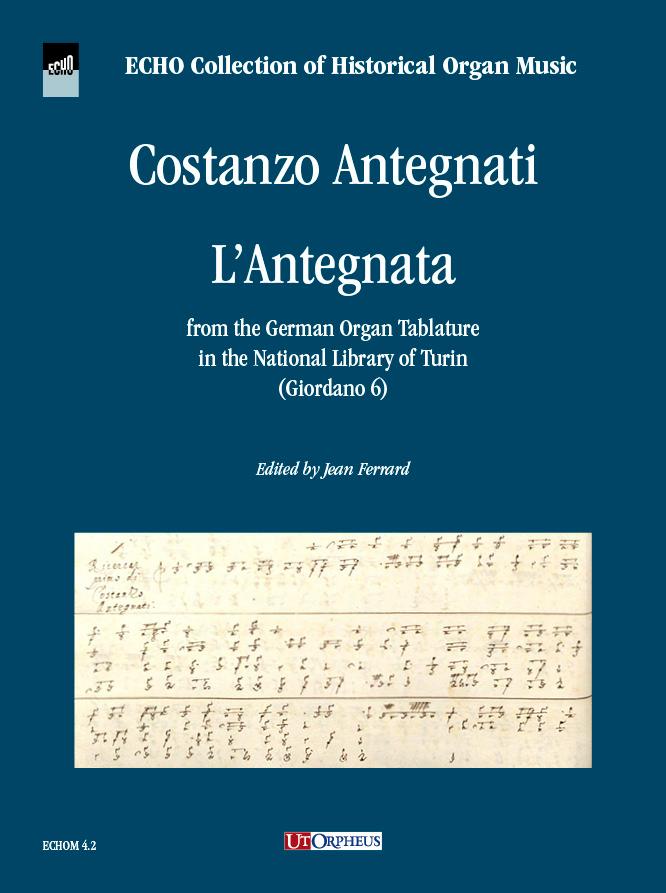ECHOM
L'Antegnata (Venezia 1608) - L'Arte Organica (Brescia 1608) Vol. 4-1, edited by Roberto Antonello.
Costanzo Antegnati (1549-1624) 92 pages.
The fourth volume of the ECHOM series presents a modern critical and practical edition of Costanzo Antegnati’s L’Antegnata (1608). The work survives in two main sources: the original 1608 print and a manuscript copy in the Turin Tablature (Giordano 6), written in German tablature.
Initially, the Turin manuscript was thought to clarify issues of accidentals and performance practice, since its notation precisely indicates sharps, flats, and pitch variations. While earlier scholars debated the reliability of this source — with some viewing its differences as errors and others as intentional improvements — new analysis suggests that both views hold some truth.
The printed 1608 edition focuses on practical keyboard use (“for the hands”), often simplifying polyphony and omitting certain details, whereas the Turin manuscript presents a more intellectual and contrapuntally precise version (“for the mind”). Because the two sources represent distinct approaches, the editors decided against merging them into a single hybrid version.
Instead, ECHOM 4 offers both texts side by side: Roberto Antonello’s transcription of the 1608 print, with translations by Frederick James, and Jean Ferrard’s transcription of the Turin manuscript, allowing readers to compare and appreciate both perspectives.
L'Antegnata (from the German Organ Tablature in the National Library of Turin - Giordano 6) Vol. 4-2, edited by Jean Ferrard.
Costanzo Antegnati (1549-1624) 72 pages.
The fourth volume of the ECHOM series presents a modern critical and practical edition of Costanzo Antegnati’s L’Antegnata (1608). The work survives in two main sources: the original 1608 print and a manuscript copy in the Turin Tablature (Giordano 6), written in German tablature.
Initially, the Turin manuscript was thought to clarify issues of accidentals and performance practice, since its notation precisely indicates sharps, flats, and pitch variations. While earlier scholars debated the reliability of this source — with some viewing its differences as errors and others as intentional improvements — new analysis suggests that both views hold some truth.
The printed 1608 edition focuses on practical keyboard use (“for the hands”), often simplifying polyphony and omitting certain details, whereas the Turin manuscript presents a more intellectual and contrapuntally precise version (“for the mind”). Because the two sources represent distinct approaches, the editors decided against merging them into a single hybrid version.
Instead, ECHOM 4 offers both texts side by side: Roberto Antonello’s transcription of the 1608 print, with translations by Frederick James, and Jean Ferrard’s transcription of the Turin manuscript, allowing readers to compare and appreciate both perspectives.
Flores de Musica (1620) Vol. III, edited by João Vaz.
Manuel Rodrigues Coelho (c1555-1635) 272 pages.
Manuel Rodrigues Coelho was born in Elvas, in the Eastern part of Portugal, around 1555 and died in Lisbon in 1635. During his life he held positions as an organist in his hometown and in Badajoz (Spain), later being appointed organist of the Royal Chapel in Lisbon. Flores de musica, his only known work, was printed in Lisbon in 1620 by Pedro Craesbeeck.
The original edition of Flores de música is a volume with 235 folios of music printed in open score. All the musical pieces use a system of four staves, except for the so-called Versos para se cantarem ao orgão (Verses to be sung at the organ), which use five staves (four for the organ and one for the line which is to be sung). The musical text is preceded by a twelve-page introductory section including Coelho’s dedication to the king, the printing licence, the technical opinion of the eminent polyphonist Frei Manuel Cardoso (1566-1650), five poems (by different authors) in praise of Coelho and his music and a Prologo and Advertencias particulares by the composer.
Flores de Musica (1620) Vol. II, edited by João Vaz.
Manuel Rodrigues Coelho (c1555-1635) 192 pages.
Manuel Rodrigues Coelho was born in Elvas, in the Eastern part of Portugal, around 1555 and died in Lisbon in 1635. During his life he held positions as an organist in his hometown and in Badajoz (Spain), later being appointed organist of the Royal Chapel in Lisbon. Flores de musica, his only known work, was printed in Lisbon in 1620 by Pedro Craesbeeck.
The original edition of Flores de música is a volume with 235 folios of music printed in open score. All the musical pieces use a system of four staves, except for the so-called Versos para se cantarem ao orgão (Verses to be sung at the organ), which use five staves (four for the organ and one for the line which is to be sung). The musical text is preceded by a twelve-page introductory section including Coelho’s dedication to the king, the printing licence, the technical opinion of the eminent polyphonist Frei Manuel Cardoso (1566-1650), five poems (by different authors) in praise of Coelho and his music and a Prologo and Advertencias particulares by the composer.
Flores de Musica (1620) Vol. I, edited by João Vaz.
Manuel Rodrigues Coelho (c1555-1635) 156 pages.
Manuel Rodrigues Coelho was born in Elvas, in the Eastern part of Portugal, around 1555 and died in Lisbon in 1635. During his life he held positions as an organist in his hometown and in Badajoz (Spain), later being appointed organist of the Royal Chapel in Lisbon. Flores de musica, his only known work, was printed in Lisbon in 1620 by Pedro Craesbeeck.
The original edition of Flores de música is a volume with 235 folios of music printed in open score. All the musical pieces use a system of four staves, except for the so-called Versos para se cantarem ao orgão (Verses to be sung at the organ), which use five staves (four for the organ and one for the line which is to be sung). The musical text is preceded by a twelve-page introductory section including Coelho’s dedication to the king, the printing licence, the technical opinion of the eminent polyphonist Frei Manuel Cardoso (1566-1650), five poems (by different authors) in praise of Coelho and his music and a Prologo and Advertencias particulares by the composer.
The Camphuizen Manuscript, edited by Pieter van Dijk and Frank van Wijk.
First complete edition, combining a scholarly transcription and a facsimile of the manuscript. VII + 97 pages.
Since 1960 the Library of the Utrecht University (NL) possesses an important source of Dutch keyboard music from the middle of the seventeenth century. The manuscript, in parchment binding written on music paper from the Amsterdam Publisher Paulus Matthijsz († 1684), contains 36 anonymous pieces for keyboard instrument. 21 are based on melodies from the so-called “Stichtelycke Rymen” by Dirck Rafaelsz Camphuysen (1586–1627), 9 are based on Genevan Psalm melodies, 2 on Balletti by Gastoldi and 4 on secular tunes. No composer names are mentioned. The carefully written manuscript is in one handwriting, probably the composer himself. No other sources of the pieces exist.
From the 36 pieces in the manuscript only a selection of 6 pieces was published by Alan Curtis in: Nederlandse klaviermuziek uit de 16e en 17e eeuw / Dutch keyboard music of the 16th and 17th centuries (Monumenta Musica Neerlandica III, Amsterdam 1961).
Brussels, Royal Library, Ms II 3326 mus. Works by Abraham Van den Kerckhoven and other composers, edited by Jean Ferrard.
First complete edition. XXIII + 417 pages in two volumes.
This manuscript of the music department of the Royal Library of Belgium is of utmost importance in the history of organ music in Belgium: it is the main (and almost only) source for the music of the Brussels organist ABRAHAM VAN DEN KERCKHOVEN.
The 160 folios of the manuscript open with a Gloria (9 verses), one Salve Regina (5 verses), a Missa Duplex (17 verses). The next pieces are two series of many short verses in the eight church modes, followed by a third series, which stops after the third mode. The end of the manuscript (from folio 95 on, that is a little bit less than half of the whole manuscript) contains varied pieces (Fantasias, Fugues, Preludes and fugues) of larger scope.
The name or the initials of Kerckhoven are to be found at more than 24 occasions. Besides that, the manuscript contains the names of C. Vaes, A. Kolfs, Paepen and L. F. One piece by Girolamo Frescobaldi is also present. Most of the unsigned pieces may be attributed to Abraham Van den Kerckhoven, either because of their vicinity to signed compositions, or for their stylistic resemblance to signed pieces.
The manuscript has been partially published: A. (van den) Kerckhoven, Werken voor orgel, edited by Jos. Watelet, Berchem-Antwerpen, De Ring, 1933 (Monumenta Musicæ Belgicæ) but this score is nowadays out of print.
ECHOM 1 is the first complete publication of the whole manuscript, since Watelet published 137 pieces only, out of 364. The introduction of course mentions biographical discoveries made after 1933.






